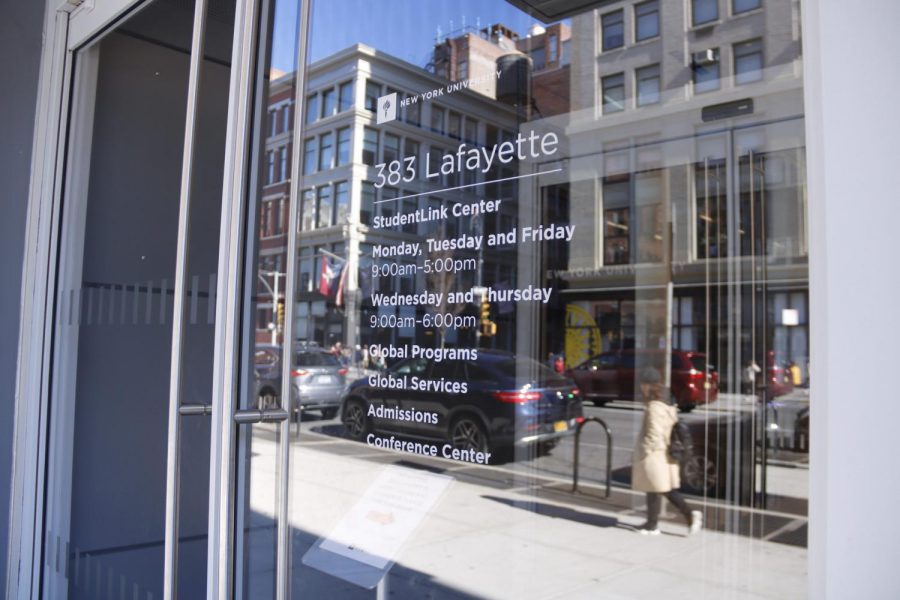Opinion: NYU should expand institutional financial aid for transfer students
NYU remains one of the most expensive universities in the United States. Despite its overwhelming financial resources, its financial aid options for transfer students are inexcusably paltry.
383 Lafayette St. houses the Office of the Bursar which deals with student financial aid. When it comes to financial aid allocation, transfer students are at a great disadvantage. (Staff Photo by Alex Tran)
October 4, 2021
It is a university’s responsibility to care for its students, but transfer students at NYU are often left with their financial needs unmet. NYU, which boasts a whopping $4.7 billion endowment as of August 2020, charges a colossal tuition of $56,500 a year, not including the cost of housing, transportation, insurance or food. It fails, however, to offer a majority of transfer students adequate institutional financial aid. This lack makes transferring to NYU inaccessible for many students unless they take on a crippling amount of debt and punishes students financially for not choosing NYU the first time around.
Transfers make up about 10% of NYU’s student population, but their access to aid is minimal. Unless they are eligible for CCTOP, the GUIDE Program or the POISE Program, or are enrolled in a Second Degree Transfer Program in the Rory Meyers College of Nursing, transfers are denied access to institutional tuition support. A majority of transfer students — an appalling two-thirds — do not receive institutional grant aid, according to university spokesperson John Beckman. Federal aid such as Pell Grants is an option for some students. However, the maximum award available for the 2021-22 academic year is $6,495, which only covers 11.5% of NYU’s tuition.
Transfer students will leave university and enter the working world as NYU alumni, but they are not viewed as equal to traditional students by the NYU administration — especially the Office of Financial Aid. On the NYU undergraduate admissions page, subheadings in bold text read “Affording New York University.” Directly underneath, a box reads “Discover Financial Aid,” which leads to explanations of financial aid and payment options. However, the page displaying transfer student requirements offers far less material. It falls to transfer students to inquire about financial aid, a process that requires significant effort. At the very least, there should be a disclaimer or some sort of fine print — like on those medication commercials or grocery store coupons — saying something like “Warning: This institution contains elitism and is for trust fund transfer students only.”
Across the country, transfer students tend to receive less aid from universities. According to the 2015-16 National Postsecondary Student Aid Study, students in bachelor’s degree programs who change schools are granted $4,701 less in institutional aid on average — 42% less than first-years — and are 12.3% less likely to receive such aid. In NYU’s case, they’re most likely to receive no aid. Compounding these financial burdens, the median national household income decreased from $69,560 to $67,521 between 2019 and 2020. Despite this economic downturn, NYU increased its tuition by 3%.
NYU’s financial aid is supposedly allocated according to each student’s “financial need and academic strength.” But transfer students with financial difficulties are overlooked by the administration. In December 2019, the Affordability Steering Committee and Working Group published a report titled “A Presidential Commitment to Affordability,” in which the Momentum Campaign was detailed. The campaign, which raised almost $1.3 billion for scholarships, exceeded its goal by $300 million. The overshoot could have been used to make institutional financial aid accessible to all transfer students in need, but it was not.
Transferring schools is an arduous process. The possibility of losing credits, the unknown costs of attending a new institution and the uncertainty of how long it might take to finish one’s degree cause transfer students a great amount of anxiety. The university’s lack of financial support for transfer students is an additional source of stress. NYU should increase the amount of financial aid available to transfer students. It is within the university’s means to do so, and every student deserves a financially accessible and quality education.
Contact Morgan Caramello at [email protected].

























































































































































Brax cutchin • Oct 4, 2021 at 6:50 pm
Morgan, I really enjoyed your article. Well written. ! ???